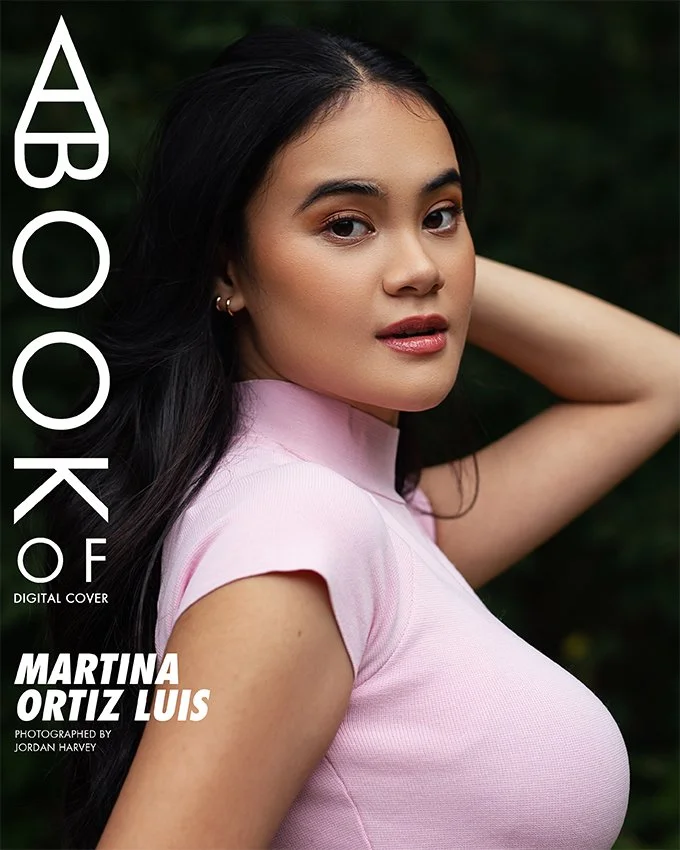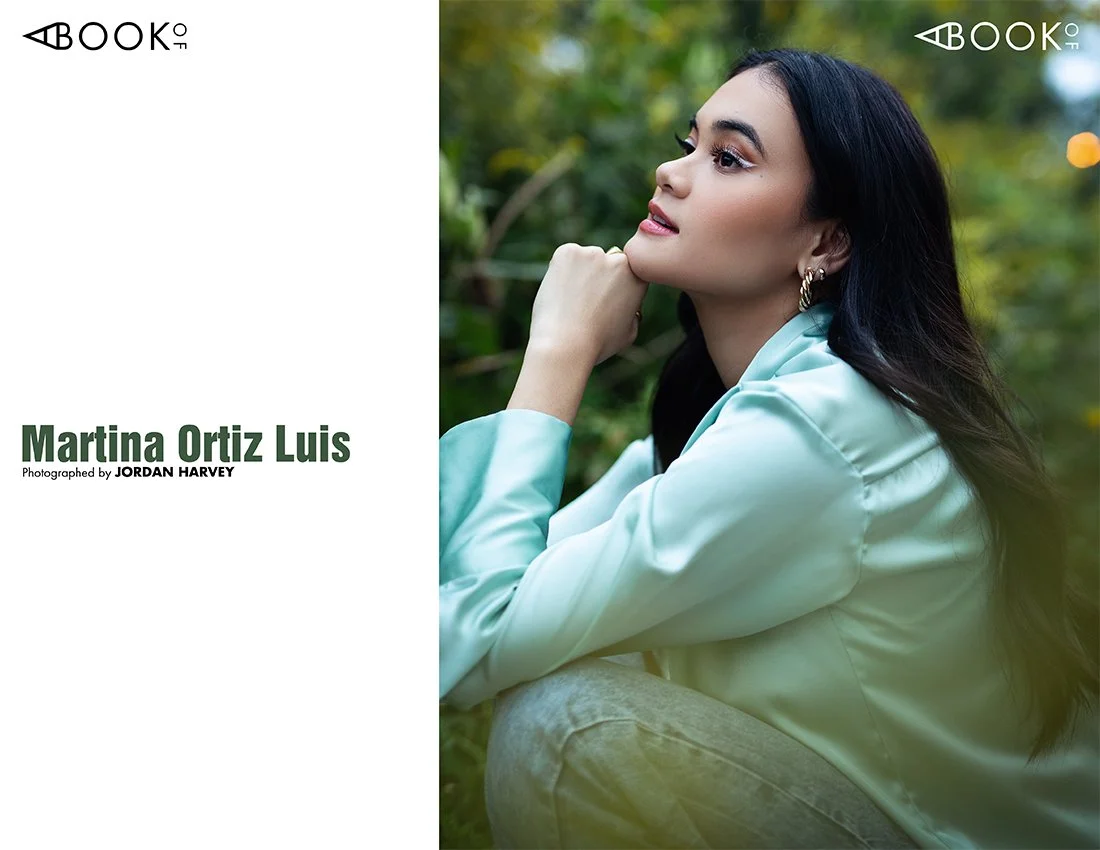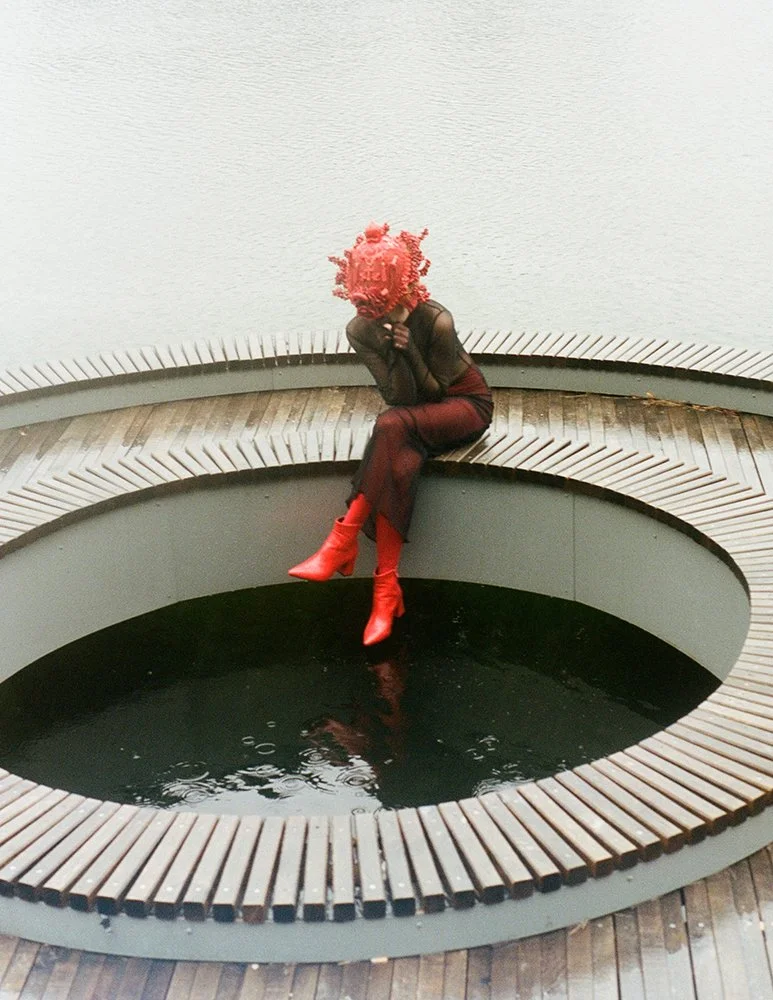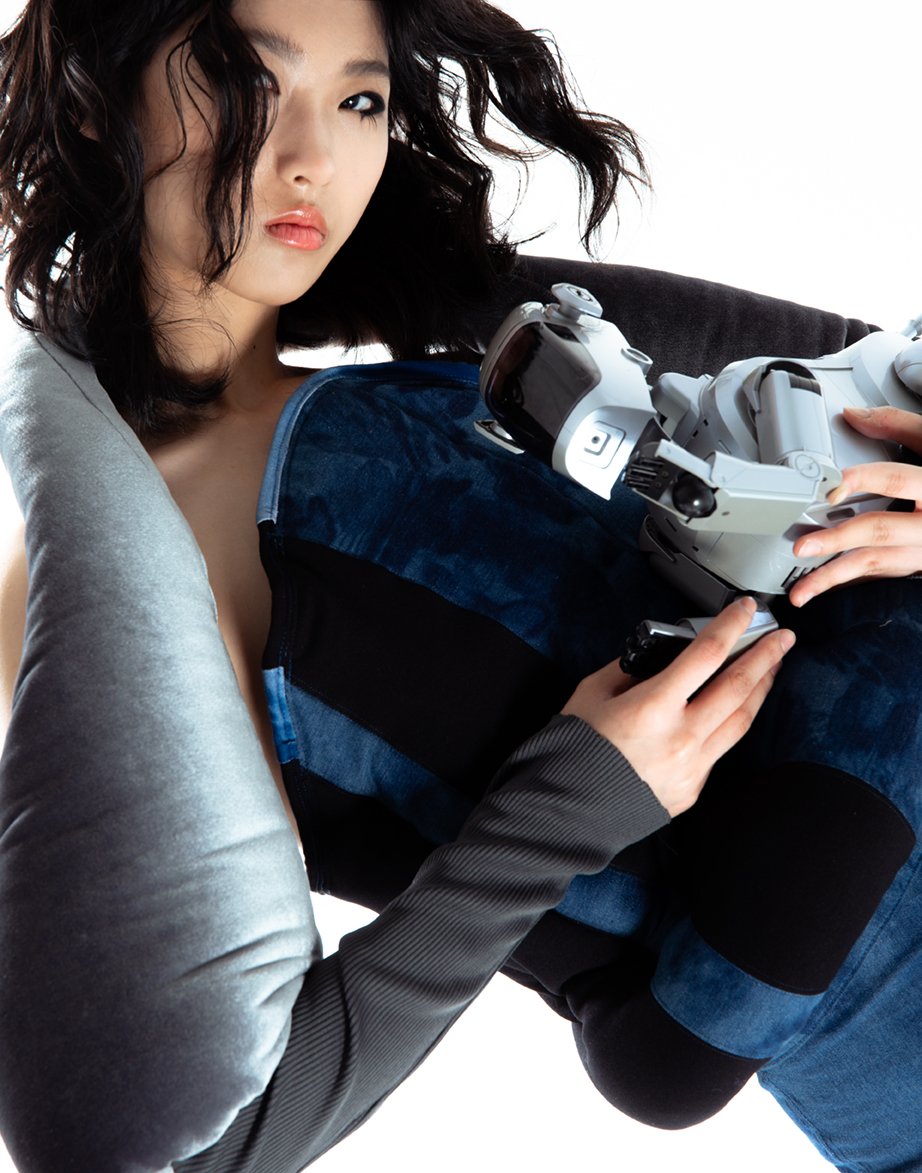MARTINA ORTIZ LUIS
PHOTOGRAPHER: JORDAN HARVEY
MARTINA ORTIZ LUIS steps into a scene like the opening bar of a pop anthem: precise, electric, and impossibly present—bracingly bright, grounded in Toronto grit and unafraid to take up space as Veronica in Juliet & Romeo. This bold pop-musical reimagining pairs Rebel Wilson and Jason Isaacs with a daring creative team. She doesn’t sneak into a moment; she stakes it: years of singing the national anthem on NHL ice taught her to hold thousands of breaths at once, eight-show weeks in The Lion King taught her pacing and endurance, and a string of TV roles taught her how to make genre switches feel effortless.
On screen in Juliet & Romeo, she marries Shakespeare’s ache to chart-topping bravado, belting a specially composed number that reveals new textures in a performer you thought you already knew. Off camera, she talks craft with the same clarity she brings to a chorus: stamina, curiosity, and a refusal to dilute truth. Read on for a profile of an artist who treats big numbers like intimate confessions and who says, simply and without fanfare, “To be able to bring that part of myself to a character like this, on screen, was something really special.”
Hi Martina, how are you? Thank you for your time. What keeps you excited nowadays? What fuels your passion?
Hi! I’m good, thank you very much. Nowadays, I have to say this summer weather is keeping me excited. I absolutely adore summer in Toronto. I’d say just living and experiencing life right now is fuelling my passion. I’m surrounded by some really cool, artistic souls right now who inspire me and excite me. I’m just excited to see what this summer and the back half of 2025 will bring!
How did growing up in Toronto and discovering your love for performance at such a young age guide your decision to pursue the arts and inform the authenticity you bring to every role?
I’ve been involved in the arts from such a young age, and growing up in the Greater Toronto Area definitely played a big role in shaping that journey. I was lucky to have access to great teachers, mentors, and studios throughout my life, especially having gone to an arts school, and to be surrounded by people who genuinely care about nurturing creativity and curiosity in young performers. Additionally, Toronto is the most multicultural city in the world, and growing up in that kind of environment I think naturally builds a certain empathy and openness. Whether it was being from Woodbridge, going to school in North York, or working downtown, I was always exposed to different communities, different perspectives. That experience taught me how to connect with people from all walks of life, and I think that’s maybe what helps inform a sense of “authenticity” - that you’ve mentioned - to my work. Especially when taking on new characters or roles, I approach it all with openness and minimal judgement. It’s not something I’ve tried to manufacture per se, I think it partly just comes from growing up in such a dynamic, diverse environment. Toronto didn’t just give me access to the arts, it shaped how I see the world, and that perspective continues to inform every role I take on.
How did your years at the Cardinal Carter Academy for the Arts shape your artistic identity and give you the tools to move from student showcases to professional stages?
Carter helped shape my foundation as an artist. Being in the vocal program meant we were singing for at least 60 to 80 minutes every day, sometimes for hours on end with added rehearsals, which really helped me develop vocal strength and stamina. It also provided us with a healthy environment to learn how to take criticism, how to collaborate, and how to stay focused and consistent. All of which are things I hope I still carry with me now. We would perform regularly for school concerts, and at the time I was also performing all around the city - singing for events, singing the anthems for the Leafs, and also starting to audition for TV and film.
What meant a lot to me was how supportive my school was of my life outside the classroom. I never felt pressured to choose between school and my career. In fact, I was encouraged to pursue it professionally, and that kind of belief early on really mattered. To this day, I still have past teachers and classmates who reach out with support. Some of those classmates are now thriving in the industry too, and I honestly hope I get the chance to work with them someday soon.
How did stepping onto the ice as the national anthem singer for the Toronto Maple Leafs at 15 teach you about commanding a live audience and set the stage for your confidence in front of cameras?
Singing the anthems for the Leafs for six years was a huge lesson in consistency and performing under pressure. Stepping onto the ice in front of some of the best athletes in the world, with thousands of people watching live in the arena and millions more at home for every game, there’s nothing like it. It’s a live performance - no second take. It taught me how to stay focused and grounded, even with the amount of energy and potential distractions around me. Having that experience as a teenager, especially, I think really helped me build that consistency and confidence in my ability to perform no matter what’s happening around me.
How did landing the role of Rachel Valdez in Wynonna Earp’s fourth season transform your understanding of character work, and what discoveries did you make about yourself through the show’s blend of action and emotion?
Landing the role of Rachel Valdez was a huge step for me. It was my first major television role, so a big part of that experience was just learning how to be on set. There’s so much happening behind the scenes, and you really have to be grounded in your character and the story because there are so many starts and stops and you never film in the scenes’ or sometimes even the episodes chronological order. For example, we shot episodes three and four first before going back to one and two, which meant I had to portray Rachel in the middle of her arc, but on my very first day on set. And because I came into the show’s fourth season, this world of Wynonna Earp was already well-established, with a passionate fanbase and very specific lore. I had to understand the rules of the universe - the lore, the tone, and in my case, a very specific backstory that was never portrayed on screen but was key to who Rachel was and how she entered the story. It was such a key learning experience, both in terms of the craft and the responsibility that comes with stepping into a story that already means so much to people.
Balancing the supernatural elements of Wynonna Earp with the realistic human experience of Rachel's journey: how did you achieve this?
Honestly, what helped was that everyone on our set cared deeply about the story. We were never “playing into” the supernatural or sci-fi of it all, we were playing real human beings, part of this found family, who just happened to exist in a world with these extraordinary circumstances. Our characters were written with such beautiful depth and humanity to them, which helped ground everything. And I have to say, getting to act alongside people like Melanie Scrofano, Kat Barrell, Dominique Provost-Chalkley, Tim Rozon, Varun Saranga, Greg Lawson, Billy Bryk, Savannah Basley, just to name a few, made it even easier. They’re all wonderful actors and even better human beings. That sense of connection and care really helped me stay grounded in Rachel’s journey.
How did joining Roku’s Most Dangerous Game: New York as Josie Suero deepen your appreciation for moral complexity on screen, and what did you draw on to navigate Josie’s most harrowing choices?
The series really pushes you to think about how far you’d go to protect the people you love. That’s what I found so compelling about Josie and her brother Victor, they both constantly challenge that throughout the series. To tap into that, I honestly just thought about my own family - my parents, my cousins who are like brothers to me, my nieces. If I were in that same situation, in absolute desperation, what would I do to protect them? And the truth is, I’d probably go pretty far. I think most people would do some crazy things if choices were limited, when it comes to love and survival. That’s what grounded the role for me. Approaching Josie’s choices not as extreme, but as deeply human.
How do you sustain the discipline and energy required to perform eight shows a week in Disney’s The Lion King, and what lessons has that marathon of live theatre taught you about resilience and ensemble camaraderie?
It’s definitely taught me the importance of pacing myself, sneaking in rest, both physical and mental, wherever I can. Also to be intentional with my energy. And this ensemble is just amazing. Our cast is full of unbelievably talented souls who are also just genuinely kind, grounded people. They lead with light and love, and that kind of camaraderie is so important in a unique space like this where you're constantly pushing your body and mind. Unlike the “conventional” workspace, you’re together six days a week, seeing each other miss family moments, recover from injuries, improvise when things go wrong, push through tough mental health days. There are days when you’ll need to lean on your people, and days they’ll need to lean on you. That support is everything.
How did you approach stepping into Veronica’s world in Juliet & Romeo, melding Shakespeare’s timeless themes with a fresh musical pop sensibility, and what creative instincts guided your performance?
Stepping into Veronica’s world was such a fun challenge. The film plays with so many layers - it’s rooted in Shakespeare’s original themes, but the way it’s told is totally fresh, current, campy and bold. So I really tried to approach the storytelling with that same mix, honouring the emotional stakes and depth, while also leaning into the colourfulness of the world and the musical numbers.
For Veronica's specially composed song, how did your interpretation and performance of the original arrangement enable you to explore the full extent of your vocal capabilities and unveil previously unseen dimensions of your artistic expression to listeners?
Audiences haven’t seen me in a role like this before, so getting to step into Veronica while also performing these huge musical numbers like “Better Than This”, felt both exciting and really vulnerable. There were so many moving pieces in putting the numbers together - the music, choreography, camera work - but the actual act of singing truly felt like home. That part was liberating, because I’ve been singing for audiences since I was a little girl. To be able to bring that part of myself to a character like this, on screen, was something really special. It pushed me emotionally in new ways, and it was a chance to show a different side of myself - not just as a vocalist, but as a storyteller.
How do you navigate the emotional roller coaster of auditions, rejections, and breakthroughs, and what strategies keep you grounded when the industry’s highs and lows feel unpredictable?
This industry can surely be tough. The highs can be real high and the lows, real lows. It takes real practice to learn how to let go. You give so much of yourself to an audition or a role, but once it’s out of your hands, you have to release it and trust that what’s meant for you will find you. That said, I’ve also learned that it’s okay to let yourself feel it - to take time to process the losses and near-misses, even mourning just wrapping on a job. I have learned to give myself permission to take an hour or a day to just sit in bed, cry a little, journal, order fast food and a bubble tea - whatever I need at that moment. Then I pick myself up and go back to the work. You really can’t dwell. I’m also really lucky to have a support system of family and friends who ground me and remind me of my worth beyond any one job. And I try to stay proud of how I’ve shown up and put myself out there, taking risks, even when the answer is “no” and to just focus on what’s next.
How do you envision using your growing platform to champion causes and communities that matter to you, and what impact do you hope to make offstage and on?
Arts education is incredibly important to me. Whether it’s music, visual art, acting, filmmaking, photography, writing, reading, or dance, I think engaging with any form of art opens up the heart and mind in ways that are really powerful. It gives young people a healthy outlet for expression, and it also helps them build empathy by connecting to different cultures, perspectives, and histories. I’d love to use my platform to help make the arts more accessible, especially for communities that don’t always have access to those resources, especially here in Toronto. At the end of the day, I hope to encourage the next generation to stay curious, stay expressive, and lead with empathy.
Having proven you can pivot seamlessly between action, drama, and musical performance, how do you envision applying this hybrid skill set to future projects, and which story elements excite you most as you filter roles through this new lens?
Thank you for the kind words. Yeah, I feel really lucky to have been able to explore different genres this early on in my career, and it’s made me even more curious about what’s possible moving forward. I think characters who are morally complex, who sit in those grey areas, are especially exciting to me. There’s just truly so much more to explore, and I’d love to keep pushing myself with roles that challenge me. I’m drawn to stories that feel grounded in truth but aren’t afraid to take risks - ones that feel a little unexpected. I’m just excited to see what the future holds and to keep growing through the work.
How would you describe the personal evolution you’ve experienced over the past year, and what legacy do you hope your journey leaves as you embark on the next chapter of your career?
This past year has been full of growth, both personally and professionally. I’ve been pushed out of my comfort zone - and through that, I’ve gotten to know myself more clearly, what I value, how I want to show up in spaces, and the kind of workspace I want to be a part of. I think I’ve learned to take up space with a little more confidence, while also staying grounded in curiosity and gratitude. And moving into this next chapter, I hope the legacy I’m building reflects that - someone who leads with care, who shows up fully, puts in the work, and has a lot of fun doing it.
Lastly, if you were a book, what book would you be and why?
Oh my god. I love this question. I think where I’m at right now, I’d be something that lives in the dark academia space. A little mysterious, fantastical, romantic. Like something written by Carlos Ruiz Zafón. The kind of story that lingers, layered with history and passion, full of characters trying to make sense of love, memory, and legacy. That quiet intensity is so fun and really resonates with where I’m at in my life right now.















